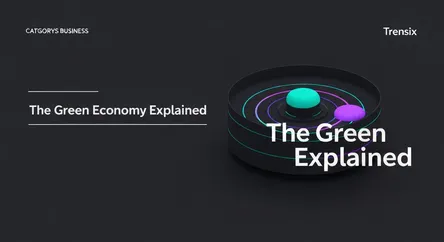Business
The Green Economy Explained

Discover the Green Economy: an economic model focused on sustainability, social equity, and environmental health. Learn why it's gaining momentum.
What is it?
A green economy is an economic system aimed at sustainable development without degrading the environment. It seeks to reduce environmental risks and ecological scarcities, with core principles of being low-carbon, resource-efficient, and socially inclusive. Unlike traditional models that often prioritize growth at the planet's expense, the green economy integrates environmental health into its framework. This involves shifting investment towards renewable energy, sustainable agriculture, clean transportation, and waste management systems that promote a circular, rather than linear, use of resources.
Why is it trending?
The concept is gaining traction due to the escalating climate crisis and growing public awareness. International agreements have pushed governments and corporations to adopt stricter environmental regulations and sustainability goals. Investors increasingly see long-term value in green technologies and sustainable businesses, driving significant capital into the sector. Furthermore, consumer demand is shifting towards eco-friendly products and services, compelling companies to adapt their practices to stay competitive and meet the expectations of a more conscious market.
How does it affect people?
The transition to a green economy impacts daily life significantly. It creates new "green jobs" in sectors like solar panel installation, wind turbine manufacturing, and energy efficiency. It can lead to improved public health through reduced pollution and cleaner living environments. However, it can also present challenges, such as the initial higher cost of green products or energy. It also risks displacing workers from traditional fossil fuel industries, highlighting the need for "just transition" policies that provide retraining and support for affected communities.